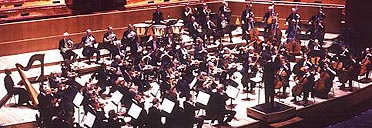
Kurt Masur's career as a conductor is uniquely associated with global politics. In 1989, he was in charge of the Leipzig Gewandhaus Orchestra as Germany was reunified; now he finds himself at the centre of another world-changing crisis. As well as running the London Philharmonic Orchestra, he is music director of the New York Philharmonic. The first concert of the LPO's new season expressed the musicians' solidarity with their transatlantic colleagues.
Anne-Sophie Mutter's cancellation meant that, instead of Beethoven's Violin Concerto, the first half presented Strauss's Four Last Songs, sung by Felicity Lott. These meditations on loss, love, and death were almost unbearably moving in the context of the minute's silence that preceded the concert. Lott's singing, although choked with emotion, was sumptuously radiant. There was comfort, too, in Masur's fastidious direction and the LPO's rapt concentration.
The composition of Bruckner's Third Symphony is a confusing story of revisions, versions and editions. Masur chose the final, 1889 score: it's arguably the least convincing, but he made every bar supremely compelling, and the LPO played magnificently. The first movement was full of monumental grandeur, as Masur shaped each climax with magisterial conviction. But there was intimacy in his interpretation as well, in the heartfelt song of the second theme, or the moments of calm before the violent storm at the very end of the movement.
For all the seriousness and care of this performance, there was still room for the bizarre side of Bruckner's music. Masur relished the rustic swagger of the central section of the scherzo, and toyed with the orchestra in the weird juxtaposition of polka and chorale in the finale. The end of the symphony was a blaze of major-key glory, as the theme of the first movement returned as a symbol of emphatic triumph. With Masur's dignity and the LPO's virtuosity, it was almost possible to believe in Bruckner's story of darkness transforming into light.

